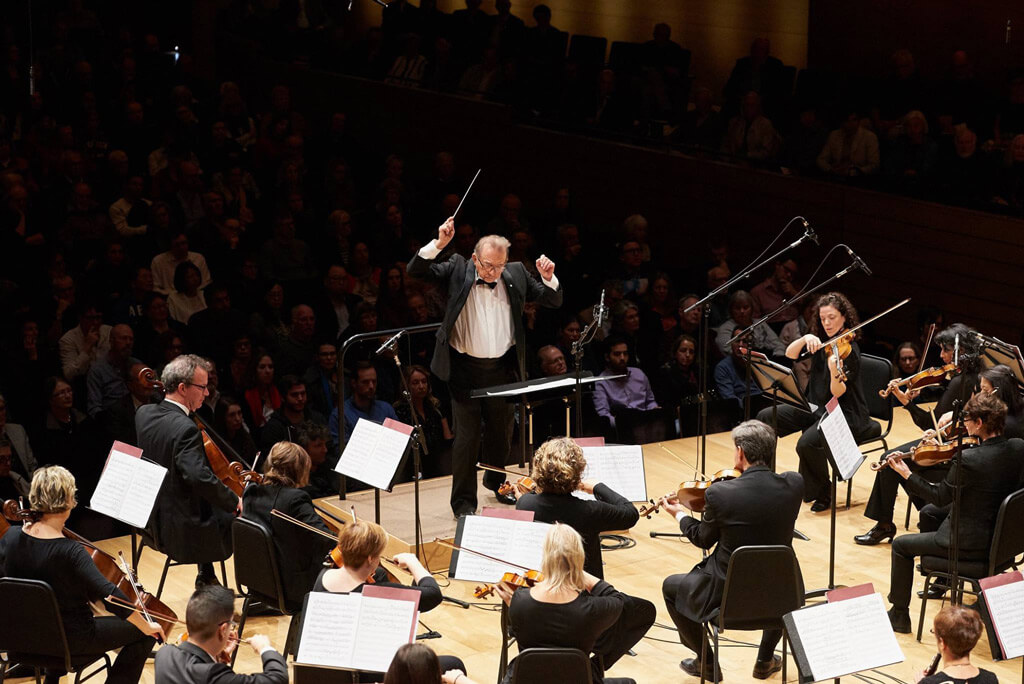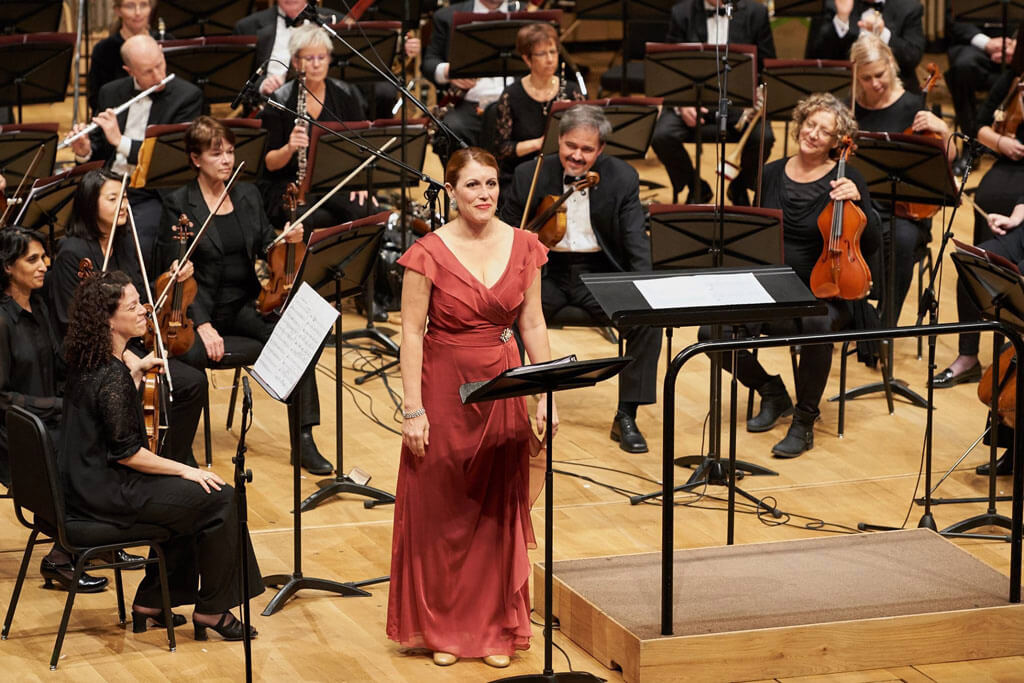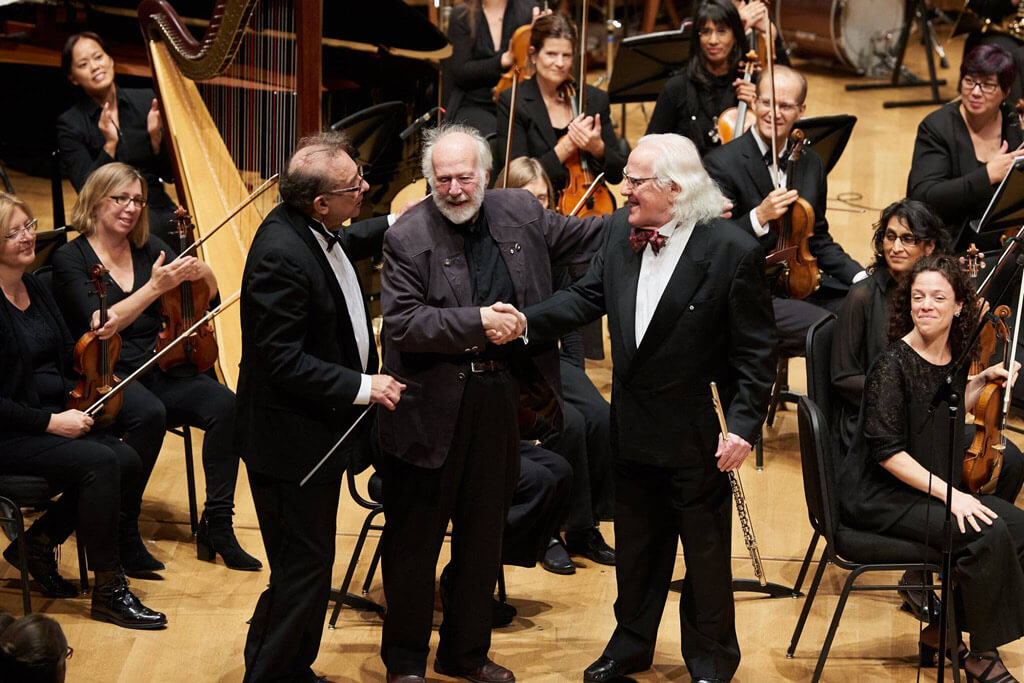
Esprit Orchestra with Alex Pauk (conductor) Krisztina Szabo (mezzo-soprano) Robert Aitken (flute) Ryan Scott (percussion) at Koerner Hall. Sunday, Oct. 23.
It is hard to fully grasp (and write about) the legacy of composer R. Murray Schafer because his work forms the musical and creative air that we breathe here in Canada. A composer, educator, dramatist and pioneering sound ecologist, Schafer’s work is recognizable by its intense creativity and holistic approaches, while often containing a deep respect for nature and mythology. His largest work, the Patria cycle, makes Wagner’s Ring Cycle look provincial by comparison.
So, how does Esprit Orchestra distil down the immense legacy of Schafer into one evening of music? By focusing mainly on Schafer, the composer, Schafer the writer of concert overtures, concerti, and orchestral song. In fact, based on this cross-section of Schafer’s work, it is hard to even imagine that this is the same composer of provocative works like Requiems for the Party Girl or La Testa d’Ariadne, which really built Schafer’s legacy. To portray Schafer in this way is maybe not intentional, but I wonder if it is a sign of the times, with the era of avantgardism and experimentation firmly behind us. Orchestras are conservative bodies to begin with, but in spite of this lack of adventure, Esprit manages to give us an evening of Schafer at his most musically vulnerable.
The concert opened with Schafer’s 1990 overture, Scorpius, inspired by the constellation that rises in the southern hemisphere during the summer months. The caustic, energetic piece, full of tricky time changes, conjured memories of Khachaturian and Shostakovich. The members of Esprit played with an inspired level of commitment, though this was marred slightly by a clunky, hesitant middle section that sapped the vigour out of this quirky overture.

The second piece on the program, Adieu Robert Schumann for orchestra and mezzo-soprano, brought Krisztina Szabó into the role of Clara Schumann, reflecting on the last days of her ailing husband. The piece opens hazily with a quote from Schumann’s lieder “Dein Angesicht”, sung by Szabó and accompanied by Stephen Clarke on the piano, though this is eerily interrupted by a dissonant pedal of strings, bringing this strange fantasy to an end. The piece continues in this fashion: hallucinatory references to Schumann’s music while dissonant, agitated backdrops accompany Szabó’s thoughts and lamentations. Thus Schafer reveals his undeniable talent for bucking expectation and conjuring allusion. Szabó enthusiasts might have been let down by the lack of vocal pyrotechnics in this extended threnody, as the endlessly surprising mezzo shaded her voice with restraint and contemplation.
The third composition of the evening was the most traditional concert piece yet: a concerto for flute and orchestra from 1984, performed by its original soloist, Robert Aitken. The concerto, in three movements, opens with a demanding jet stream of agitated notes for the soloist, which Aitken managed with little sweat. The second movement, opening with a series of loud, sinister chords, gives way to a spooky berceuse of flute, harp and percussion. The final movement, another agitated allegro similar to the opening movement, ends enigmatically with a cadenza of slapping keys and ghostly whistles before the orchestra slams the door shut with a defiant march.

The evening concluded with another concerto, this time for percussion and by maverick American composer, Andrew Norman. The concerto, Switch, is filled to the brim with wacky, disjunctive energy from the orchestra and a long parade of smashes, bangs, and jangles from soloist Ryan Scott. The concerto’s demands on the soloist are remarkable, requiring mechanical precision and coordination as they move between instruments. Scott was demonstrably comfortable in this demanding role, easily choreographing his way through a large conglomeration of instruments. Sadly, the 30-or-so minutes of entertainment ends on a rather uneventful note, with Scott pensively hitting a series of Thai gongs, as if Norman were trying to recover some meaning to his entertaining scramble of musical gestures. Sometimes it’s better to keep the fun going rather than waxing Socratically at the end of it all.
Esprit Orchestra is already gearing up for their second concert on November 20th, featuring music by George Crumb, Marc-André Dalbavie, Zosha Di Castri and Phillipe Leroux.
[Correction: Oct 28: A previous version incorrectly stated composer Andrew Norman was British, when in fact, he is American.]
#LUDWIGVAN
Want more updates on Toronto-centric classical music news and review before anyone else finds out? Follow us on Facebook or Twitter for all the latest.
- PREVIEW | U of T Faculty of Music Brings Salvatore Sciarrino to Toronto - January 27, 2017
- PREVIEW | The Music Gallery Gears Up For The Viking Of 6th Avenue - November 25, 2016
- SCRUTINY | Esprit Orchestra Salutes The Legacy Of R. Murray Schafer - October 28, 2016



